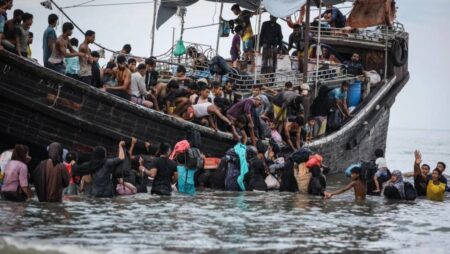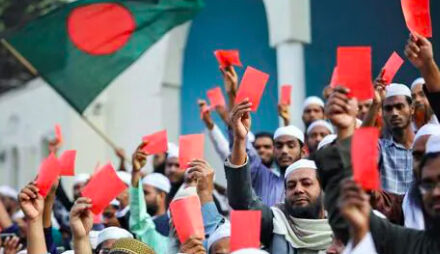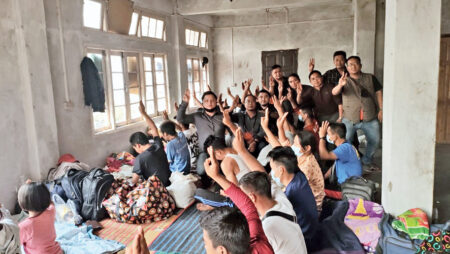MANTRAYA ANALYSIS#28: 05 AUGUST 2018
Imran Khan’s Pakistan & Prospect of ‘Peace’ in South Asia
Bibhu Prasad Routray
–
Abstract
The selective euphoria with the poll results in Pakistan’s National Assembly elections notwithstanding, Imran Khan’s ‘new Pakistan’ suffers from inherent limitations. It may not augur a new or dramatic turnaround in policy towards India and Afghanistan. Unless the military establishment is willing to revisit its position, Pakistan’s policy towards India and Afghanistan, under a new Prime Minister, is unlikely to change. However, if modest goals are set in bilateral relations with India and Afghanistan demonstrating their willingness to give Mr. Khan a chance, his chances of delivering on his promises would be greater.
(Imran Khan in an election rally in June 2018, Photo Courtesy: The Guardian)
On 25 July, ahead of voting in Pakistan’s general elections, Army Chief General Qamar Javed Bajwa urged the people to vote to defeat the “inimical forces”[1] working against the country. After the Pakistan Tehreek-i-Insaf (PTI) emerged as the largest party in the National Assembly with 115 seats in the elections, which is largely believed to have been rigged in favour of the PTI, the army’s spokesperson Major General Asif Ghafoor took to Twitter to underline that the objective has been fulfilled.[2] The PTI will manage to put together a coalition government and its leader Imran Khan would be the country’s prime minister. This would invariably serve the interests of the men in uniform. How should India and Afghanistan reconcile to this reality in Pakistan is the subject of analysis of this article.
Conciliatory Gestures
“I really want to fix our ties… If they take one step towards us, we will take two, but at least (we) need a start.”
On 28 July, Khan in his press conference after the results were announced attempted to appear conciliatory and statesman like. His speech was devoid of plans for Pakistan’s economy which is undergoing one of the worst crises. He neither spoke of land or tax reforms. His plans for peace with India, however, were conciliatory. “I really want to fix our ties… If they take one step towards us, we will take two, but at least (we) need a start.” While he made no reference to Kashmir, he underscored the trade ties with India. “The number one priority of any government should be trade ties with India,” he said.
On 29 July, President of Afghanistan Ashraf Ghani telephoned Khan to congratulate him. Although Khan’s office did not reveal the details of the conversation, Ghani took to Twitter to underline that Khan has to ‘overcome the past’.[3] Ghani tweeted, “I just spoke to @ImranKhanPTI and congratulated him on the victory in parliamentary elections. We both agreed to overcome the past and to lay a new foundation for a prosperous political, social and economic future of both countries #Afghanistan and #Pakistan.”
Winds of change in South Asia?
The PTI contested the elections on a platform to bring about change, leveraging on the legacy of corruption of the previous government. Khan promised a new Pakistan that he would transform the country into an Islamic welfare state. Although PTI’s manifesto mentioned ‘strategic discussions with India to curb proliferation of arms and ammunition’, it was largely silent on how Khan would address the distrust that Pakistan generates from its two neighbours. Will Khan’s new Pakistan start its relations with India and Afghanistan afresh or will the military continue to cast its long shadow on his India and Pakistan policy?
There is little doubt that Imran Khan is Rawalpindi’s poster boy. Short of a coup, Khan in the Prime Minister’s seat is the best scenario that the military can hope for. The fact that he does not have clear majority also plays into the hands of the military. Khan’s state is somewhat comparable to Aung Saan Suu Kyi of Myanmar, whose victory in the 2015 elections has translated to nothing significant as the military remains firmly in control, vide the country’s 2008 constitution.
Afghanistan is witnessing a surge in violence. The number of civilians killed in Afghanistan reached a record in the first half of 2018. Forty percent of these 1692 fatalities were attributed to the Taliban[4], which is believed to be the recipient of Pakistan military’s generous patronage. Neither has United States President Donald Trump’s moves to pressurize Pakistan by sharply decreasing military assistance demonstrated results, nor has the peace process with the Taliban progressed substantially. Amid such bleak scenario, Imran Khan’s proximity with the military arouses an unrealistic hope in President Ghani.
Majority among the policy experts in New Delhi, however, are of the firm opinion that the Pakistan military would ensure an unchanged India policy. Unverified reports do suggest that the Indian High Commission was in touch with Khan for last few months prior to the elections. However, the reaction of the Ministry of External Affairs (MEA) was in sharp contrast to Ghani’s overtures, who went to the extent of inviting Khan to visit Kabul. The MEA, in contrast, expressed hope that the new government of Pakistan will work constructively to “build a safe, stable, secure and developed south Asia free of terror and violence”. There was no formal statement by the MEA. “We welcome that the people of Pakistan have reposed their faith in democracy through general elections”[5], the foreign ministry spokesperson said in response to a journalist’s query on elections in Pakistan. Prime Minister Narendra Modi, who was the recipient of Khan’s predecessor Nawaz Sharif’s gesture of attending his swearing in ceremony in May 2014, made a courtesy telephone call only on 31 July.
A soft line towards India?
“Modi ka jo yaar hai, ghaddar hai ghaddar hai”
In the past months, contradictory signals have emerged from Pakistan, with regard to the prospect of peace with India. The military has indicated, in multiple ways, some sort of strategic flexibility that it is not averse to peace with India. In March 2018, the Army chief, General Qamar Javed Bajwa invited the Indian military attaché and his team in Pakistan to the Pakistan Day military parade in Islamabad.[6] This was a historic first. Subsequently, General Bajwa said two weeks later that the Pakistan military wanted peace and dialogue with India”[7]. This year, the military even invited a team of South Asian journalists including two from India on a conducted tour to Rawalpindi. Among other examples of Pakistan’s assuaging gesture is former Pakistan National Security Advisor General Nasser Janjua’s statement in a regional conference on ‘Connectivity and Geo-Economics in South Asia’ organized by the Pakistan Institute of Peace Studies (PIPS) on 27-28 June 2018. General Janjua noted that ‘stability in South Asia is a prerequisite for its connectivity and it is only through connectivity economic growth and stability can be brought about’[8].
These ingenuities, however, have come along with almost weekly exchanges of fire along the Line of Control in Kashmir[9]; also, amid media reports that the terrorist infrastructure in Pakistan remains intact and the military is, in fact, firmly behind a project of mainstreaming the terrorists. Recent investigative reports suggest that Jaish-e-Mohammad (JeM), the outfit responsible for countless acts of terror in Jammu & Kashmir and an attack on the Indian parliament, “has been secretly building work on a 15-acre complex on the outskirts of the city of Bahawalpur—five times the size of its existing headquarters.”[10]
Khan himself has been a firm critic of former Prime Minister Nawaz Sharif. He has taunted Sharif over his “friendship” with Indian Prime Minister Narendra Modi and accused the two of creating the law and order situation in the country and tension at the border to manipulate the situation in favour of the rival PML-N. Khan himself tweeted once, “Beginning to wonder why whenever Nawaz Sharif is in trouble, there is increasing tension along Pakistan’s borders and a rise in terrorist acts? Is it a mere coincidence?” In the same spirit, Khan’s supporters, which incidentally include the outfits like JeM, have raised slogans like “Modi ka jo yaar hai, ghaddar hai ghaddar hai”[11] (whomsoever is Modi’s friend is a traitor) in his rallies.
One can argue that to make peace with India, Khan would need to break free of such rhetoric and convince his supporters consisting of, among others, religious fanatics and bandwagon of Islamic orthodoxy, to start admiring policies of the man they viscerally hated, Nawaz Sharif. Khan would probably be risking hold over his political constituency by any such action. But observers of elections in South Asia would concur that speeches in election rallies are rarely factored into the policies of parties elected to power. The strategy to gain votes is clearly distinct from the strategy to run the affairs of a country.
Message from New Delhi
Khan, in his speech on 28July, said that he is willing to take two steps towards peace if New Delhi takes one. The response from New Delhi has been cold, bordering on the negative. Interestingly some analysts have prescribed that India should learn to ignore Pakistan. P Chidambaram, former Home and Finance minister and leader of the Congress Party, however, argued that although Khan could be only posturing on the eve of being sworn in as Prime Minister, but “nothing would be lost if we take Mr. Khan at his word and appeal to him deliver on his words”[12]. President Ghani’s gesture indicates his willingness to chart a similar path.
Can the Indian government adopt a similar line? With India going to polls in less than a year, how easy would it be for the ruling Bharatiya Janata Party (BJP) to take any step towards friendship, especially amid continuing border firing and infiltration attempts by terrorists? Pakistan does not figure prominently in the imagination of the Indian voters, barring those inhabiting the border states like Punjab and Jammu & Kashmir. However, like Khan, who carries the burden of his past and whose actions are likely to be influenced by his allies, the government in New Delhi too is a prisoner of its proclaimed muscular approach on Pakistan.
Prudency, however, would be to aim for modest gains such as stopping the border shelling, resuming the process of dialogue, nudging Pakistan to prosecute the perpetrators of the Mumbai terror attacks and other confidence building measures. Success in those would form the foundation for future engagements and may be, resolution of intractable issues. The specter of possibilities should drive policies rather than the trap of pessimism.
–
End Notes
[1]Bajwa said, “We are target of inimical forces working against Pak. We’ve come a long way in our comprehensive national effort to fail them. We are united & steadfast to defeat them, and ‘TODAY’ through our ‘VOTES’. Please come out & vote undeterred”. See Mahmood Idrees, “Come out to defeat anti-Pakistan forces through VOTES, COAS Bajwa urges nation”, Daily Pakistan, 25 July 2018, https://en.dailypakistan.com.pk/pakistan/come-out-to-defeat-anti-pakistan-forces-through-votes-coas-bajwa-urges-nation/. Accessed on 3 August 2018.
[2]“The Director General Inter-Services Public Relations (ISPR) tweeted from his verified personal account a Quranic verse, which translates as: “[O Allah,] You exalt whom You please, and abase whom You please”. This was a thinly-veiled reference to the PMLN’s election slogan “vote ko izzat do(uphold the dignity of the vote)”. The DGISPR was effectively taunting Nawaz Sharif and his party that the God has degraded them. See Mohammad Taqi, “Pakistan: An Election Heist and Beyond”, The Wire, 29 July 2018, https://thewire.in/politics/pakistan-elections-imran-khan. Accessed on 30 July 2018.
[3]Fahad Chaudhry, “Afghan President Ghani, Imran Khan ‘agree to overcome past’”, Dawn, 29 July 2018,https://www.dawn.com/news/1423669/afghan-president-ghani-imran-khan-agree-to-overcome-past. Accessed on 29 July 2018.
[4]“Civilian deaths in Afghanistan at record high, UN says”, The Guardian, 15 July 2018, https://www.theguardian.com/world/2018/jul/15/civilian-deaths-afghanistan-record-high-un-says. Accessed on 31 July 2018.
[5]“Desire Pak At Peace With Neighbours”: India Reacts To Imran Khan Win”, NDTV, 29 July 2018, https://www.ndtv.com/india-news/hope-new-pakistan-government-will-help-build-south-asia-free-of-terror-india-1891428. Accessed on 29 July 2018.
[6]Kamran Yousef, “In a first, Indian diplomats attend Pakistan Day parade in Islamabad”, Express Tribune, 23 March 2018, https://tribune.com.pk/story/1667651/1-first-indian-diplomats-attend-pakistan-day-parade-islamabad/. Accessed on 28 July 2018.
[7]Kamal Alam, “Pakistan’s Military Reaches Out to India”, RUSI, 3 May 2018, https://rusi.org/commentary/pakistan’s-military-reaches-out-india. Accessed on 28 July 2018.
[8]In a panel discussion with Shanthie Mariet D’Souza, Gen. Janjua emphasized on the need for regional connectivity. “India Needs Pakistan For Economic Access To Europe: Former Pak NSA”, NDTV, 29 June 2018, https://www.ndtv.com/india-news/india-needs-pakistan-for-economic-access-to-markets-former-pak-nsa-nasser-janjua-1875328. Accessed on 30 July 2018.
[9]In December 2017, the Indian government said there was a 230 percent increase in ceasefire violations along the Line of Control (LoC) in 2017 compared to 2016. In 2017, Pakistan violated ceasefire 771 times along the LoC while the figure stood at 228 last year. There were 153 violations in 2014.
[10]Praveen Swami, “Exclusive: Jaish-e-Mohammed’s giant new training centre begins to blossom in Imran Khan’s Pakistan”, FirstPost, 27 July 2018, https://www.firstpost.com/world/exclusive-jaish-e-muhammads-giant-new-training-centre-begins-to-blossom-in-imran-khans-pakistan-4835701.html. Accessed on 28 July 2018.
[11]“Imran Khan taunts Sharif over his ‘friendship’ with Narendra Modi”, Economic Times, 14 July 2018, https://economictimes.indiatimes.com/news/politics-and-nation/imran-khan-taunts-sharif-over-his-friendship-with-narendra-modi/articleshow/64986800.cms. Accessed on 28 July 2018.
[12]P Chidambaram, “With India going to polls in less than a year from now”, Indian Express, 5 August 2018, https://indianexpress.com/article/opinion/columns/across-the-aisle-engaging-with-mr-imran-khan-5291928/. Accessed on 5 August 2018.
(Dr. Bibhu Prasad Routray is Director, Mantraya. This analysis is published as part of Mantraya.org’s ongoing ‘Regional Economic Cooperation and Connectivity in South Asia’, and ‘Mapping Terror and Insurgent Networks’ projects. The author can be contacted at <bibhuroutray@mantraya.org> and <bibhuroutray@gmail.com>. All Mantraya publications are peer reviewed.)
For PDF copies of the publication, write to office@mantraya.org
To read previous Mantraya Analyses CLICK HERE



